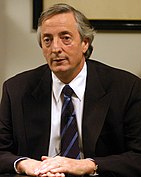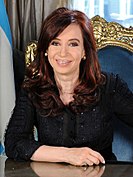Our website is made possible by displaying online advertisements to our visitors.
Please consider supporting us by disabling your ad blocker.
Kirchnerism
Kirchnerism Kirchnerismo | |
|---|---|
  Néstor Kirchner (left) and Cristina Fernández de Kirchner (right) served as Presidents of Argentina from 2003–2007 and 2007–2015, respectively. | |
| Leader | Cristina Fernández de Kirchner |
| Founder | Néstor Kirchner |
| Founded | 1 March 2003 |
| Headquarters | Buenos Aires |
| Youth wing | The Campora |
| Membership | Justicialist Party |
| Ideology | Peronism[1] Anti-neoliberalism[2][3] Social democracy[4][5][6] Left-wing populism[7][8] Progressivism[9] Socialism of the 21st century[10][11][12] Factions: K Radicalism[13] Keynesianism[14] Communism[15] Bolivarianism[16] Liberation theology[17] |
| Political position | Centre-left[18] to left-wing[19][20] |
| National affiliation | Front for Victory (2003-2017) Citizen's Unity (2017-2019) Frente de Todos (2019-2023) Union for the Homeland (since 2023) |
| Seats in the Chamber of Deputies | 90 / 257
|
| Seats in the Senate | 32 / 72
|
| Website | |
| www | |
| Part of a series on |
| Progressivism |
|---|
 |
Kirchnerism (Spanish: Kirchnerismo [kiɾʃneˈɾismo]) is an Argentine political movement based on ideals formed by the supporters of spouses Néstor Kirchner and Cristina Fernández de Kirchner, who consecutively served as Presidents of Argentina. Although considered a branch of Peronism, it is opposed by some factions of Peronists and generally considered to fall into the category of left-wing populism.[9][21][22] It is considered a representative of the socialism of the 21st century,[10][11][12] although similarly to Peronism and in contrast to other left-wing ideologies, it is highly nationalist and populist rather than class-based.[23]
Although originally a section in the Justicialist Party, Kirchnerism later received support from other smaller Argentine political parties (like the Communist Party or the Humanist Party) and from factions of some traditional parties (like the Radical Civic Union and the Socialist Party). In parties which are divided along Kirchnerist/Anti-Kirchnerist lines, the members of the Kirchnerist faction are often distinguished with the letter K (for instance "peronistas/justicialistas K", "radicales K" or "socialistas K") while the anti-Kirchnerist factions, those opposing Kirchnerism, are similarly labelled with the expression "anti-K".
- ^ Goodman, Peter S. (10 May 2019). "Argentina's Economic Misery Could Bring Populism Back to the Country". The New York Times. Retrieved 5 July 2020.
- ^ Ruckert, Arne; Macdonald, Laura; Proulx, Kristina R. (2017). "Post-neoliberalism in Latin America: a conceptual review". Third World Quarterly. 38 (7): 1583–1602. doi:10.1080/01436597.2016.1259558. S2CID 157767263.
- ^ Melber, Henning; Brand, Ulrich; Nicola, Selkler (2009). Postneoliberalism – A Beginning Debate. Dag Hammarskjöld Foundation. ISBN 978-9185214525.
- ^ Veltri, Gustavo (28 February 2008). "La idea de Kirchner de afiliar al PJ a la socialdemocracia generó revuelo interno". www.cronista.com (in Spanish). Retrieved 2022-01-02.
- ^ Kaufman, Alejandro (2011). "What's in a Name: The Death and Legacy of Néstor Kirchner". Journal of Latin American Cultural Studies. 20 (1): 103. doi:10.1080/13569325.2011.562635. S2CID 191567015.
- ^ Chaves, Claudio (15 November 2019). "El peronismo, entre la socialdemocracia y la izquierda". Infobae (in Spanish). Retrieved 4 October 2022.
- ^ Dube, Ryan; Lewis, Jeffrey T. (August 12, 2019). "Argentine Peso Dives After Populist Peronists Gain Edge in Vote". The Wall Street Journal.
- ^
- Tharoor, Ishaan (29 October 2019). "The anti-neoliberal wave rocking Latin America". The Washington Post.
- Dube, Ryan (19 August 2019). "Argentina's Fernández Moves from Little-Known Politician to Next Likely President". Wall Street Journal.
- ^ a b Montañez, Julio Ramírez (27 June 2016). "The XXI century socialism in the context of the new Latin American left". Civilizar Ciencias Sociales y Humanas. 17 (33). Colombia: Universidad Pontificia Bolivariana: 97–112. doi:10.22518/16578953.902.
This socialism of the XXI century, overflowed the Venezuelan experience and became a trend that took greater force throughout Latin America, especially in Ecuador with its President Rafael Correa, in Bolivia implemented by its president Evo Morales and in Argentina initially with Néstor Kirchner and later with his wife Cristina Fernandez de Kirchner, as well as in Nicaragua, El Salvador, Uruguay. This ideological conception sought primarily to give responses to the serious problem of underdevelopment in which the region lives due to the social imbalances, injustice and inequality (Hamburger, 2014).
- ^ a b "Winds of change in the Latin American political arena for 2017" (PDF). Developing Ideas (5). Madrid: LLYC: 11. 2017.
In terms of South America, three years ago it had three centre-right governments (those of Juan Manuel Santos in Colombia, Horacio Cartes in Paraguay and Sebastián Piñera in Chile), three centre-left governments (Ollanta Humala in Peru, Dilma Rousseff in Brazil and José Mujica in Uruguay) and four of the similarly heterogeneous, Socialism of the 21st century and allies (Nicolás Maduro in Venezuela, Rafael Correa in Ecuador, Evo Morales in Bolivia and Cristina Kirchner in Argentina).
- ^ a b "Kirchnerismo bolivariano del siglo XXI". La Nación (in Spanish). 2010-05-29. Retrieved 2023-02-04.
La cuestión central no es, entonces, disfrazar con más palabras lo que en realidad se puede llamar por su nombre: Néstor Kirchner practica una suerte de nacionalismo de izquierda, que Hugo Chávez denomina el "socialismo del siglo XXI".
- ^ Arias, Mariela (17 June 2019). "Tierra del Fuego: Melella se impuso a Bertone en primera vuelta". La Nación (in Spanish). Retrieved 20 October 2021.
- ^ Velasco, Andrés (2014-08-31). "Argentina's Use and Abuse of Keynes | by Andrés Velasco". Project Syndicate. Retrieved 2022-03-16.
- ^ Tekiner, Uğur (2020). "Back-to-roots again? Kirchnerismo as a reclaiming of classical Peronism". METU Studies in Development. 47 (1): 267.
This impact achieved an unprecedented point even exceeding the party divisions, in that certain groups from rival parties such as the UCR, PS (Partido Socialista - Socialist Party), and CPA (Partido Comunista de la Argentina - Communist Party of Argentina) identify themselves with Kirchnerism.
- ^ "Kirchnerismo bolivariano del siglo XXI". LA NACION (in Spanish). 2010-05-29. Retrieved 2023-02-04.
- ^ Semán, Pablo; Viotti, Nicolás; García Somoza, Mari-Sol (2018). "Secularism and liberalism in contemporary Argentina: Neoliberal responses, initiatives, and criticisms of Pope Francis" (PDF). Social Compass. 65 (4). Sage Publishing: 525. doi:10.1177/0037768618792809. hdl:11336/98313.
- ^
- "Para Pichetto, Unidad Ciudadana es un frente de centro izquierda y Randazzo, la "posición histórica del peronismo"". www.clarin.com. 16 June 2017.
- "Argentina's Peronist Repeat". The Wall Street Journal. 28 October 2019.
- ^
- "Argentina shifts to the right after Mauricio Macri wins presidential runoff". The Guardian. November 23, 2015.
- "Argentine President Stumps for Congressional Candidates". Wall Street Journal. 29 June 2013. Retrieved 13 February 2020.
Speaking to thousands of supporters in a packed soccer stadium, Mrs. Kirchner stumped for the candidates who will represent her left-wing coalition, the FPV, in October's vote.
- "Argentinian president Macri vows 'many reforms' after strong election result". The Guardian. October 24, 2017.
- "Analysis: Latin America's new left axis". BBC Online. April 18, 2006. Retrieved January 25, 2010.
- ^ "Kirchnerismo bolivariano del siglo XXI". LA NACION (in Spanish). 2010-05-29. Retrieved 2023-02-04.
- ^ Conniff, Michael L. (31 July 2012). Populism in Latin America: Second Edition. University of Alabama Press. ISBN 978-0-8173-5709-2.
- ^ Denissen, Marieke (1 October 2008). Winning Small Battles, Losing the War: Police Violence, the Movimiento Del Dolor and Democracy in Post-authoritarian Argentina. Rozenberg Publishers. ISBN 978-9051709643.
- ^ Barrett, Patrick; Chavez, Daniel; Rodríguez-Garavito, César (2008). The New Latin American Left: Utopia Reborn. Pluto Press. p. 182. ISBN 9780745326771.
Previous Page Next Page


